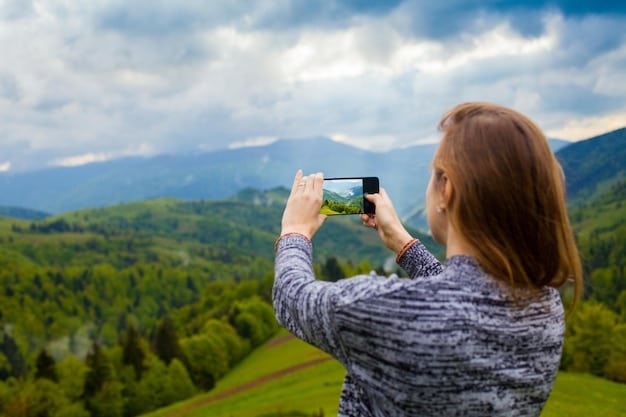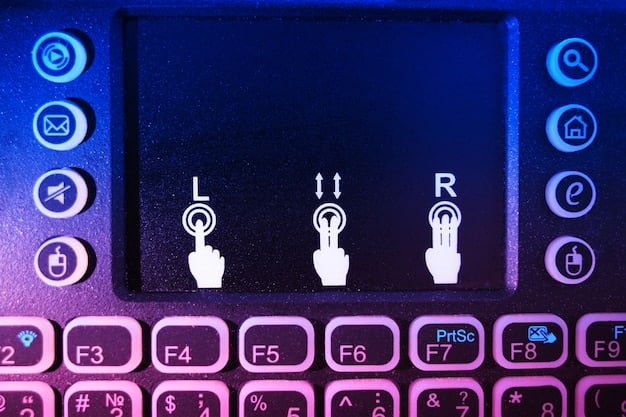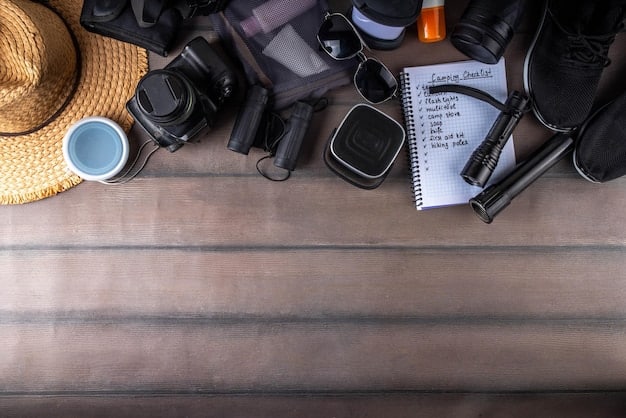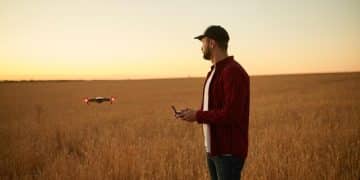Best Digital Cameras for Beginners: US Models for Stunning Photos

Digital cameras for beginners in the US offer user-friendly features and excellent image quality, making photography accessible and enjoyable for newcomers to capture stunning photos.
Are you looking to step into the world of photography but feel overwhelmed by complex equipment? Discover the best digital cameras for beginners in the US, designed to make capturing stunning photos easy and fun. These user-friendly models offer the perfect blend of simplicity and performance, allowing you to unleash your creativity without the steep learning curve.
Choosing the Right Digital Camera for Beginners
Selecting the right digital camera can seem daunting with the myriad of options available. However, focusing on your specific needs and understanding key features will simplify the process. This section will guide you through the essential considerations when choosing a beginner-friendly camera.
Understanding Different Camera Types
Beginner digital cameras come in various forms, each with its unique advantages. Compact cameras are pocket-sized and easy to carry, while DSLR and mirrorless cameras offer more versatility and control.
Consider the following factors when deciding on a camera type:
- Compact Cameras: Ideal for casual photographers needing a simple point-and-shoot option.
- DSLR Cameras: Offer interchangeable lenses, providing flexibility for different shooting scenarios.
- Mirrorless Cameras: Similar to DSLRs but lighter and more compact, with advanced features.
Ultimately, the best camera type depends on your personal preferences and shooting style.
Key Features to Look For
When evaluating digital cameras for beginners, pay attention to features like ease of use, image stabilization, and autofocus capabilities. These elements can significantly impact your photography experience.
- User-Friendly Interface: A simple and intuitive menu system is crucial for beginners.
- Image Stabilization: Reduces blur caused by camera shake, especially in low light.
- Autofocus: Fast and accurate autofocus ensures sharp, clear images.
- Megapixels: While important, more megapixels don’t always mean better image quality; consider sensor size as well.
Features like these can make a significant difference in your photography journey.

Choosing the right digital camera involves balancing ease of use with features that enhance your learning experience. Prioritizing these factors will set you on the path to capturing stunning photos.
Top User-Friendly Digital Camera Models in the US
Several digital cameras for beginners stand out for their combination of performance and ease of use. These models are specifically designed to help newcomers to photography excel without feeling overwhelmed.
Canon EOS Rebel Series
The Canon EOS Rebel series is renowned for its intuitive interface and excellent image quality. It’s a great option for those looking to step into DSLR photography without a steep learning curve.
Nikon D3500
The Nikon D3500 is another excellent DSLR choice, known for its lightweight design and easy-to-use guide mode, which provides step-by-step instructions for different shooting scenarios.
Sony Alpha Series
Sony’s Alpha series of mirrorless cameras offers a blend of compact design and advanced features, making them appealing to both beginners and experienced photographers.
- Canon EOS Rebel T7: A reliable DSLR with a user-friendly interface and excellent image quality.
- Nikon D3500: Lightweight and easy to handle, featuring a helpful guide mode.
- Sony Alpha a6000: Compact mirrorless camera with fast autofocus and manual controls for learning.
Exploring these models will give you a good starting point for finding the perfect camera.
Comparing Key Specs
When comparing cameras, consider the specific features that matter most to you, such as sensor size, autofocus points, and video recording capabilities.
Each of these cameras offers unique benefits tailored to beginner photographers. Researching and comparing their specs will help you make an informed decision.

Choosing a user-friendly camera involves assessing your needs and comparing different models to find the best fit for your photography goals.
Essential Accessories for Beginner Photographers
Enhance your photography experience with these essential accessories. Starting with the right gear can improve your image quality and make your shooting sessions more enjoyable.
Tripods
A sturdy tripod is essential for capturing sharp images, especially in low light or when using slower shutter speeds. It provides stability and reduces camera shake.
Camera Bags
A good camera bag protects your equipment from damage and makes it easy to carry your camera and accessories. Look for one that is durable, comfortable, and has enough space for your gear.
Extra Batteries and Memory Cards
Having extra batteries and memory cards ensures that you never run out of power or storage space during a shoot. Always carry spares to avoid missed opportunities.
- Tripod: Offers stability for sharp images, especially in low light.
- Camera Bag: Protects your gear and makes it easy to carry.
- Extra Batteries: Ensures you never run out of power during a shoot.
- Memory Cards: Provides ample storage for your photos and videos.
These accessories are invaluable for every photographer.
Lens Filters
Lens filters can enhance your images by reducing glare, improving color saturation, and protecting your lens from scratches. Consider investing in a UV filter, polarizing filter, and neutral density filter.
These accessories are essential for beginners keen on improving photography.
Investing in essential accessories can significantly enhance your photography and make it more enjoyable.
Mastering Basic Photography Techniques
Understanding basic photography techniques is crucial for capturing stunning images. This section will cover essential concepts to help you improve your skills.
Understanding Aperture, Shutter Speed, and ISO
Aperture, shutter speed, and ISO are the three main elements that control the exposure of your photos. Learning how to balance these settings is essential for achieving the desired results.
Composition Techniques
Composition refers to the arrangement of elements within your frame. Understanding techniques like the rule of thirds, leading lines, and symmetry can help you create visually appealing images.
Focusing Techniques
Mastering focusing techniques ensures that your subjects are sharp and clear. Experiment with different autofocus modes and learn how to use manual focus for creative control.
- Aperture: Controls the depth of field and the amount of light entering the camera.
- Shutter Speed: Determines how long the camera’s sensor is exposed to light.
- ISO: Adjusts the camera’s sensitivity to light.
These techniques enable better photography.
Lighting Techniques
Understanding light is essential for creating impactful images. Learn how to use natural light to your advantage and explore different artificial lighting techniques.
Applying these techniques consistently will significantly improve your overall photography skills.
Mastering basic photography techniques is essential for unlocking your creative potential and capturing stunning images.
Tips for Improving Your Photography Skills
Practice and experimentation are key to improving your photography skills. This section will provide valuable tips to help you on your journey.
Practice Regularly
The more you practice, the better you will become. Set aside time each week to experiment with different settings and techniques.
Seek Feedback
Sharing your work and receiving feedback from other photographers can provide valuable insights and help you identify areas for improvement. Join online forums or local photography clubs.
Take Online Courses
Numerous online courses offer comprehensive photography instruction. These courses can provide structured learning and help you master specific techniques.
- Regular Practice: Consistent shooting helps you refine your skills.
- Seek Feedback: Constructive criticism enhances your learning process.
- Online Courses: Structured learning for mastering specific techniques.
These steps will bolster your photographic journey.
Explore Different Genres
Experimenting with different genres, such as portrait, landscape, and street photography, can broaden your skills and help you discover your passion.
These habits will help you reach your photographic goals.
Consistent practice, seeking feedback, and continuous learning can help you improve your photography skills and capture stunning images.
Maintaining and Caring for Your Digital Camera
Proper maintenance and care are essential for prolonging the life of your digital camera. Follow these tips to keep your equipment in top condition.
Cleaning Your Camera and Lenses
Regularly clean your camera and lenses to remove dust, fingerprints, and other debris that can affect image quality. Use a microfiber cloth and lens cleaning solution.
Storing Your Camera Properly
Store your camera in a cool, dry place away from direct sunlight. Use a camera bag or case to protect it from dust and accidental damage.
Updating Firmware
Keep your camera’s firmware up to date to ensure optimal performance and access to the latest features. Check the manufacturer’s website for updates.
- Regular Cleaning: Remove dust and debris for optimal image quality.
- Proper Storage: Protect your camera from dust and damage.
- Firmware Updates: Ensure optimal performance and access to new features.
These habits should be part of your routine.
Battery Care
Properly care for your batteries by avoiding extreme temperatures and fully charging them before use. Store batteries separately when not in use.
Taking these steps ensures a lasting camera.
Maintaining and caring for your digital camera ensures optimal performance and prolongs its lifespan.
| Key Point | Brief Description |
|---|---|
| 📸 Camera Type | Choose between compact, DSLR, or mirrorless based on your needs. |
| 💡 Key Features | Look for user-friendly interface, image stabilization, and autofocus. |
| 🎒 Accessories | Tripods, camera bags, and extra batteries are essential. |
| ⚙️ Maintenance | Regular cleaning and proper storage extend camera life. |
Frequently Asked Questions
▼
A compact camera is often the best starting point due to its simplicity and ease of use. However, DSLR and mirrorless cameras offer more versatility as your skills develop.
▼
Image stabilization is crucial, especially when shooting in low light or using telephoto lenses. It reduces blur caused by camera shake, resulting in sharper images.
▼
Essential accessories include a tripod for stability, a camera bag for protection, extra batteries to avoid running out of power, and memory cards for storing your photos.
▼
Practice regularly, seek feedback from other photographers, take online courses, and experiment with different genres. Consistent effort leads to gradual improvement.
▼
Clean your camera and lenses regularly, store it properly in a cool, dry place, update the firmware, and take care of your batteries by avoiding extreme temperatures.
Conclusion
Choosing the right digital cameras for beginners involves understanding your needs, exploring user-friendly models, and practicing essential photography techniques. By following these guidelines, you can capture stunning photos and embark on a rewarding creative journey.





